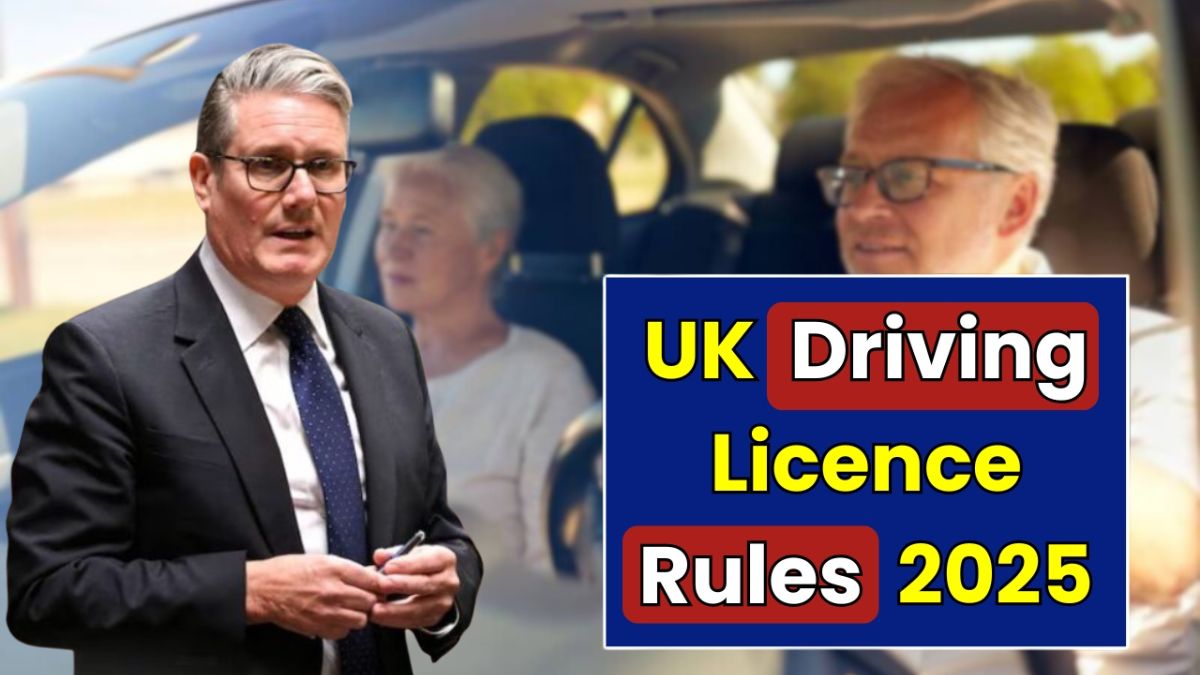The UK Government has officially announced sweeping changes to driving licence regulations for individuals aged 55 and above, set to take effect from 11 November 2025. The reform, introduced jointly by the Department for Transport (DfT) and the Driver and Vehicle Licensing Agency (DVLA), aims to enhance road safety, modernise the licence renewal process, and ensure that older drivers remain medically fit to drive.
With the UK’s ageing population and rising number of senior motorists, this move is expected to affect millions of drivers across the country. Here’s a detailed breakdown of what’s changing, why it matters, and what over-55 drivers need to do next.
Why Is the Government Changing Driving Licence Rules?

According to the government, over 11 million drivers in the UK are aged 55 or older, a figure projected to grow significantly by 2030. While many older drivers are safe and experienced, health-related issues such as declining vision, slower reaction times, and chronic medical conditions are increasingly linked to road accidents.
Officials clarify that the reforms are not aimed at penalising drivers based on age, but instead at supporting safety and wellbeing, while maintaining independence for those who are fit to drive.
Key Changes Effective from 11 November 2025
The new framework introduces several important updates for drivers aged 55+, with a strong focus on regular medical oversight and digital accessibility.
1. Renewal Cycle Reduced to Five Years
Currently, UK drivers renew their licences every 10 years until age 70. Under the new system, drivers aged 55 and above will need to renew every five years. This allows the DVLA to regularly update health records and ensure medical fitness.
2. Mandatory Health and Vision Declarations
Every licence renewal will now require:
- A self-declared health assessment
- A vision check confirmation
Drivers aged 70 and above must also submit a GP-signed medical report verifying their ability to drive safely.
Launch of the DVLA’s Digital Health Declaration System
To streamline the process, the DVLA is launching a new online portal for over-55 drivers. Through this secure digital system, motorists can:
- Upload optician certificates and GP reports
- Track renewal status
- Receive renewal reminders
The shift to online submissions is expected to replace most paper forms, reducing processing times and helping drivers stay informed.
Stricter Penalties for Withholding Medical Information
While drivers are already required to declare conditions like epilepsy, heart disease, and diabetes, the 2025 reform will increase enforcement. Failing to report a condition that could impact driving ability may now result in:
- Fines up to £1,000
- Licence suspension
- Insurance invalidation
The DVLA will be permitted to cross-reference NHS records (with the driver’s consent) to verify medical declarations and ensure compliance.
Digital Driving Licences Introduced for Over-55s
For the first time in the UK, digital driving licence cards will be made available to over-55 drivers via the official DVLA mobile app. The digital ID can be used for:
- Proof of identity with law enforcement or insurers
- Online renewals and status checks
- Instant updates on eligibility and renewals
Physical cards will still be issued, but digital licences are intended to provide added convenience.
How These Changes Will Affect Older Drivers
For most, these changes won’t interfere with daily driving habits. However, they will need to renew licences more frequently and ensure all health information is accurate and up to date.
Those with existing medical conditions should begin preparations early by:
- Booking an eye test
- Speaking to their GP
- Reviewing the DVLA’s guidelines on reportable conditions
Failure to comply may result in temporary suspensions or delays in receiving a renewed licence
Government’s Stated Goals Behind the Reform
The DfT and DVLA have outlined four key objectives:
- Improve Road Safety by identifying medical risks before they lead to accidents
- Modernise the Process through secure online systems
- Ensure Fairness, allowing healthy drivers to continue driving confidently
- Build Public Confidence that all drivers meet clear safety and health standards
Medical Community Reacts Positively to New Standards
Medical professionals have broadly supported the change, stating it encourages early detection of health conditions and promotes overall public safety.
Dr Emily Ford, a GP in London, noted:
“These checks are not about removing people from the road. They’re about ensuring the right support is in place and catching any warning signs early.”
She added that the system offers a common-sense balance between independence and responsibility.
Mixed Public Reactions: Safety vs. Hassle
The reforms have received mixed reviews from the public. While many older drivers accept the changes as necessary, others see them as bureaucratic or discriminatory.
Motoring groups like the RAC Foundation and AA have shown cautious support but warn that the digital transition must not disadvantage elderly users.
Campaigners have also urged the government to:
- Offer free eye tests or
- Subsidise medical reporting fees, particularly for pensioners on low incomes.
How to Prepare Before the Rules Take Effect
If you’re over 55, here’s how you can prepare before 11 November 2025:
- Check your current licence expiry date to see if you’ll need to renew after the new rules begin
- Schedule a vision test and keep the documentation ready
- Talk to your doctor if you have a long-term medical condition
- Create or update your DVLA online account to manage renewals digitally
- Keep track of official DVLA announcements for further updates
Being proactive now will help you avoid penalties or unexpected delays later.
What Happens If You Ignore the New Rules?
The consequences of non-compliance can be serious. Drivers who fail to renew on time or submit incomplete medical information may face:
- Fines up to £1,000
- Driving disqualification
- Loss of insurance coverage in the event of an accident
To avoid this, it’s recommended that drivers enable digital alerts and reminders through the DVLA’s new app once launched
Potential Impact on the Economy and Employment
Experts say the changes could actually benefit the economy, as healthier older drivers will:
- Continue contributing to the workforce
- Drive safely for longer
- Participate actively in local economies, especially in semi-retirement
However, analysts also caution that employers must support older drivers with age-friendly workplace policies, particularly those in logistics or delivery roles.
Looking Ahead: A Digital, Safer Future for Senior Drivers
This reform marks a pivotal shift in how the UK approaches senior driving. By combining technology, medical transparency, and driver accountability, the government hopes to create a safer and more efficient transport system.
Rather than restricting independence, the update offers a chance for older drivers to remain on the road — but with modern tools and responsible safeguards.
(5) Frequently Asked Questions (FAQs)
1. What is changing for drivers over 55 from November 2025?
Drivers aged 55 and above will now need to renew their licence every five years instead of ten. They’ll also be required to submit health and vision assessments with each renewal.
2. Will I still get a physical driving licence?
Yes. While digital licences will be introduced via the DVLA app, physical cards will still be issued. The digital version is optional but offers convenience for renewals and identity verification.
3. What medical conditions must be reported to the DVLA?
Conditions such as epilepsy, heart disease, diabetes, and dementia must be reported. Failing to do so could lead to fines, suspension, or insurance issues.
4. How can I prepare for the new rules?
You can prepare by checking your licence expiry date, scheduling an eye test, speaking to your GP about any ongoing conditions, and setting up a DVLA online account.
5. What if I miss my renewal or don’t submit medical information?
You may face a fine of up to £1,000 and lose your licence temporarily. Driving without a valid licence could also void your insurance and lead to legal consequences.



